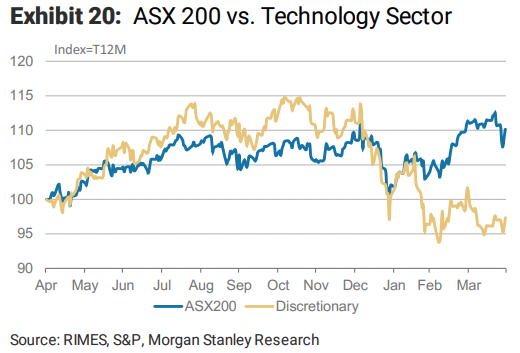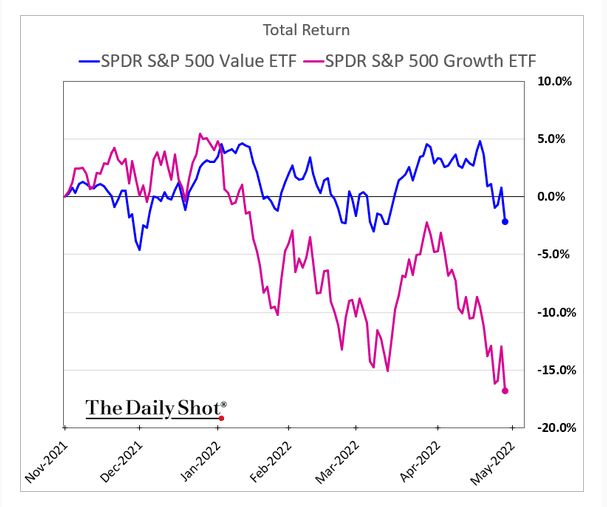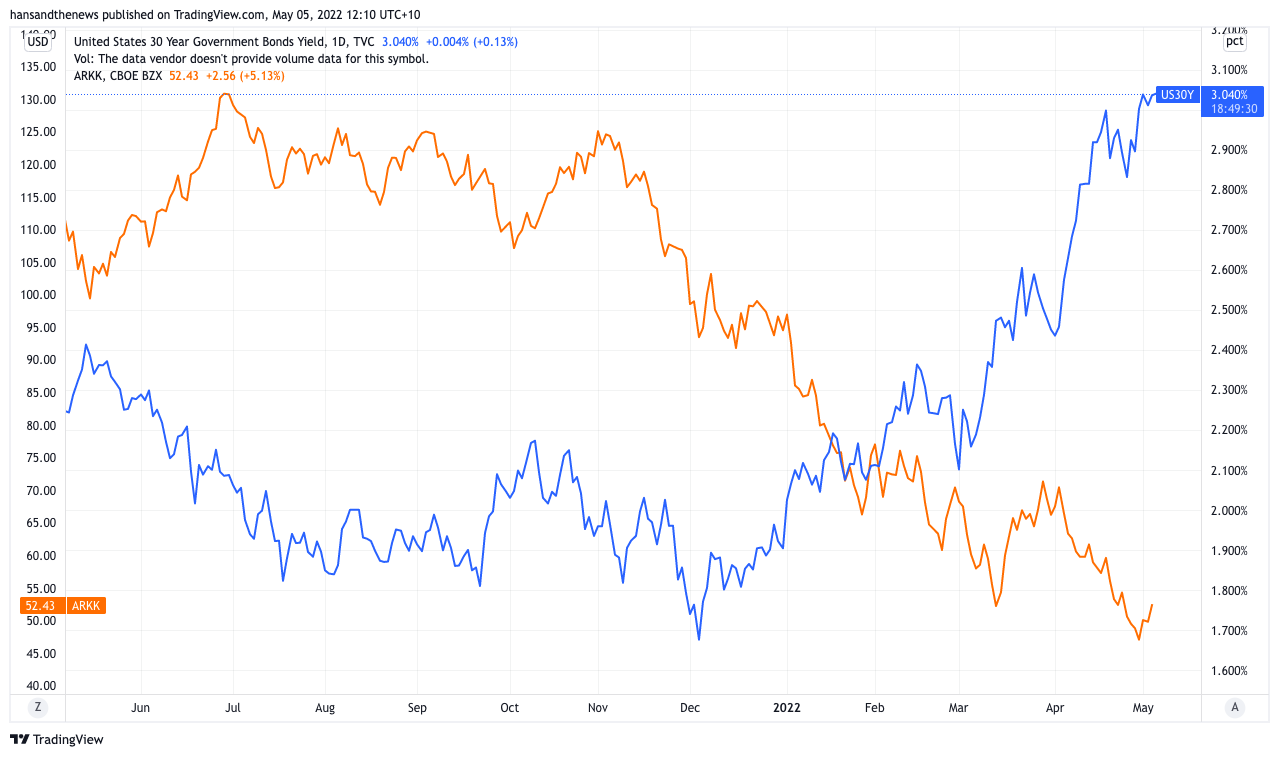Why the growth stock rout is only "30%" complete
The growth trade has undoubtedly been the best trade over the last two years. Tesla is up over 1,400% in the last five years. FAANG stocks have become a go-to acronym over the last two years. So much so that big tech now makes up nearly 20% of the S&P 500.
Let that sink in. Five stocks (not including Tesla, Rivian, or Nvidia) make up a fifth of an index which is supposedly the barometer of the US economy.
Having said this, April was also an awful month to be an investor - bonds, stocks, and commodities all took a beating. In fact, your best investment last month was the US Dollar Index (DXY) which soared as people flocked to the safe-haven trade.
Digging into those FAANG names, that group plus Microsoft lost $1.4 trillion in market capitalisation during April. Locally, the S&P/ASX All Tech Index featuring such names as ComputerShare (ASX:CPU), Block (ASX:SQ2) and Xero (ASX:XRO) has lost nearly a quarter of its value in just the first four months of this year.
This all naturally leads to the question of the year - is the growth trade dead? This wire will take a look at that question and, just as importantly, where to put your money when a certain area of the market presents little to no new opportunities.
The analysts' view
UBS strategist Richard Schellbach reckons rising rates are not posing a threat to most ASX stocks - yet. In a client note released following the RBA's 25 basis point hike, Richard noted how late the Reserve Bank is to the hiking cycle in comparison to other major counterparts. The only catch is that this phenomenon may end up being specific to only some pockets of the equity market.
The experiences of the US, Canada, the UK, and New Zealand have shown the resource-heavy equity markets of the UK and Canada managing to hold up relatively well. This illustrates how the trajectory of mining and energy stocks can remain detached from domestic rate cycles in a 'late-cycle' economic environment of high inflation and decelerating growth.
As is with rising rates, Richard says you should watch out for stocks and companies which change very quickly as soon as consumer sentiment does.
In its monthly note, Morgan Stanley chose to replace its words with a simple chart - looking at the disconnect between ASX tech and the broader index. It makes for sober reading.

Finally, this chart from The Daily Shot (via Michael Wayne of Medallion Financial) stems from the US. The big question - how long will value continue to outperform growth and just as importantly, will that trend continue to remain in tact for a long time to come?

Michael Wayne's take: Down but not out

In the short term, Michael believes it's going to be difficult in an environment where central banks are removing stimulus and lifting borrowing costs to fight rising consumer cost pressures. Further out, he thinks long-duration stocks can still do very well should these companies deliver on their forecast growth paths.
If, being the operative word.
"We have certainly reduced our exposure to “long duration” growth stocks," Michael says.
"However many of these businesses remain very high quality and have genuine long-term growth prospects and, in our opinion, are worth persisting with," he adds.
His best overseas example is Amazon (NDAQ:AMZN). In particular, Michael says that if you can last its medium-term drawdowns, there may be a good chance the stock price will then resume multi-year upward trends once a catalyst occurs.
In Australia, Michael doesn't necessarily look to technology for a growth trade. In fact, as he has revealed to me, perhaps quite the opposite! Look for names like CSL (ASX:CSL) and Macquarie Group (ASX:MQG) for options that could experience Amazon-like price action.
Finally, the near term presents inflation and war as the two main uncertainties. That's leading Michael to load up in the commodities space.
"History suggests that in an inflationary and stagflationary environment, commodity-related companies have before relatively well. As such we have adjusted our natural underweight positioning to include far more exposure to commodity-related businesses," Michael says.
Dr Philipp Hofflin: No theory to this burst bubble

Lazard Asset Management are known value-focused investors, but even Dr Philipp Hofflin could have seen this coming from a mile away. In our chat, Philipp told me he thinks there is no theory related to this growth bubble and that any talk around interest rates is all just part of a convenient narrative.
"Low interest rates were never going to justify this," Philipp says. "This was just a bubble - you don't need to make much reference to rational theory," he adds.
"The frothiness in early 2021 was worse than the late 1990's," Philipp recalls. "Now, we're seeing the unwind."
Having said his piece on interest rates, Philipp and his team do have a stake in Computershare (ASX:CPU). Most of all, he thinks we are only "30 or 40%" of the way through this growth trade rout in Australia (much less anywhere else). Australian value stocks, in his considered view, may have a good run until as late as 2024 and a lot of that will come down to earnings.
"Today, you can buy the lowest quintile of ASX stocks at 9x earnings," Philipp notes. "There is a very long way to go - but this is just the usual phenomenon of a bubble bursting."
So where else is Philipp finding opportunities? Look no further than the insurers of QBE and Suncorp (ASX:SUN). The logic here is that global premia rates bottomed out in 2019, and although the stocks have been unloved due to their huge rainy day funds (natural disasters, COVID etc.), Philipp says there is merit in these names for the long term as an unloved "balance sheet" play.
On the energy transition theme, go for a barbell approach with names like Woodside Petroleum (ASX:WPL), South32 (ASX:S32), and for something a little different, Worley (ASX:WOR). Finally, it's not a value strategy without some exposure to the cash cows that are the iron ore miners. Philipp is backing Rio Tinto (ASX:RIO) over BHP (ASX: BHP) at this time.
His only 'avoid' is the top quintile of ASX valuations by ranking - no prizes as to why that's the case.
Conclusion (and a chart, of course)
While we should never celebrate investors losing money, it's always important to take a reality check. Indeed, your base case can change when the facts change. If you want an example of that, take a look at this chart featuring a comparison of the poster child of growth against a poster child of value investing:

While January was the clear inflection point, it just shows that everyone has their time in the sun before their time in the cave. But even Goldman Sachs notes tightening financial conditions and the possibility that the economy dips into a recession is a reason for investors to opt for stability instead of an all-growth stock portfolio or an all-value strategy.
So maybe that's the answer - stability.
Never miss an insight
If you're not an existing Livewire subscriber you can sign up to get free access to investment ideas and strategies from Australia's leading investors.
I'll be in charge of asking the questions to Australia's best strategists, economists, and fixed income fund managers. If you have questions of your own, flick us an email: content@livewiremarkets.com
3 topics
10 stocks mentioned
2 contributors mentioned

